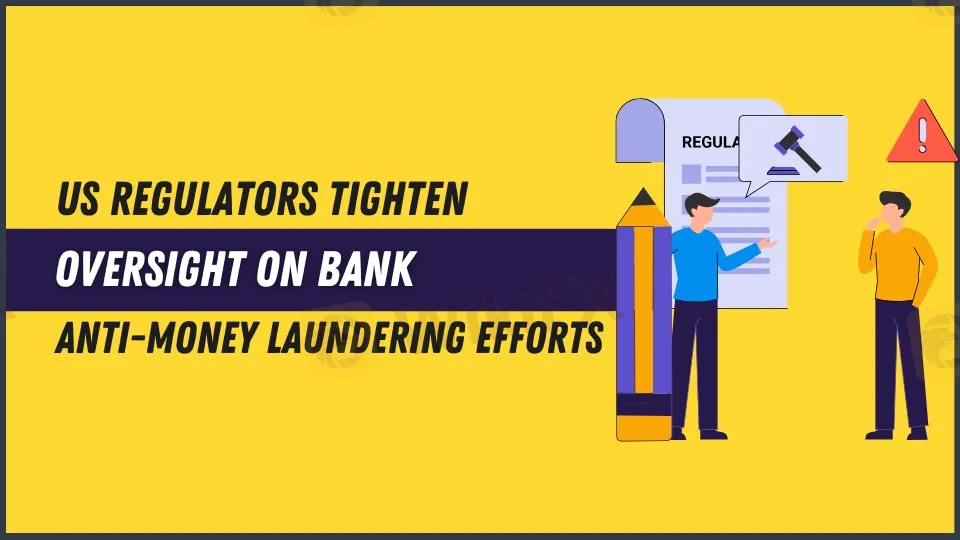简体中文
繁體中文
English
Pусский
日本語
ภาษาไทย
Tiếng Việt
Bahasa Indonesia
Español
हिन्दी
Filippiiniläinen
Français
Deutsch
Português
Türkçe
한국어
العربية
US Regulators Tighten Oversight on Bank Anti-Money Laundering Efforts
Abstract:US regulators warn banks of stricter enforcement on money laundering rules, highlighting recent penalties against major lenders like TD Bank.

U.S. regulators have issued a stern warning to banks regarding increased scrutiny over financial crime prevention efforts. The message is clear: the government will not ease its focus on combating money laundering and enforcing strict know-your-customer (KYC) regulations.
This warning comes as U.S. financial authorities ramp up enforcement after a series of high-profile failures in the banking sector. Banks are facing heightened regulatory pressure, especially on their risk management practices and anti-money laundering (AML) programs. Recent actions indicate that regulators are more willing to impose penalties for non-compliance.
A significant example is TD Bank, which was slapped with a record $3 billion fine last month for violating U.S. laws designed to curb money laundering. The fine, which stems from the banks failure to detect and prevent illicit transactions, highlights the growing importance of effective AML monitoring systems. In response to these deficiencies, TD Bank agreed to a rare asset cap, restricting its future expansion efforts in the U.S.

This trend of intensified scrutiny is not limited to TD. Wells Fargo also found itself in the crosshairs of regulators in September after the Office of the Comptroller of the Currency (OCC) discovered weaknesses in the bank‘s safeguards against money laundering and other illegal activities. The OCC subsequently imposed restrictions on Wells Fargo’s ability to enter high-risk business areas.
Additionally, Bank of America faces potential regulatory actions due to concerns over its AML controls and its failure to adequately detect sanctions evasions and other financial crimes.
Greg Coleman, the senior deputy comptroller for large banks at the OCC, emphasized that these issues must be addressed quickly, as lapses in financial crime prevention pose serious risks not only to individual institutions but to the financial system as a whole.
With growing concern over global financial stability and security, U.S. regulators are likely to continue tightening their approach toward anti-money laundering measures. Banks are advised to review and strengthen their internal practices to ensure compliance with increasingly strict regulations.
Final Thoughts
As financial institutions face mounting regulatory pressure, the message is clear: no bank is immune from scrutiny. With penalties growing more severe and enforcement actions ramping up, banks must invest in stronger AML practices and compliance measures to avoid costly mistakes and protect their operations from future regulatory risks. The heightened focus on financial crime is likely to persist, making vigilance a top priority for banking executives moving forward.

Disclaimer:
The views in this article only represent the author's personal views, and do not constitute investment advice on this platform. This platform does not guarantee the accuracy, completeness and timeliness of the information in the article, and will not be liable for any loss caused by the use of or reliance on the information in the article.
Read more

DMM Bitcoin to Cease Operations Amid Asset Transfer to SBI VC Trade
DMM Bitcoin, a prominent cryptocurrency exchange in Japan and a subsidiary of the DMM.com Group, has announced plans to shut down its operations.

Apple Pay, Google Pay Eyeing Launch in the Philippines
Apple Pay and Google Pay plan to enter the Philippine market. To do so, they must first register with the BSP as operators of payment systems.

Philippine Peso Could Hit P60 in Early 2025, DBS Says
DBS forecasts the Philippine peso to hit P60 per dollar in early 2025, with factors like US monetary policy and Trump’s trade tariffs affecting the outlook.

Coinbase Integrates Apple Pay for Easy Crypto Onramping
Coinbase adds Apple Pay to its Onramp tool, enabling fast and easy fiat-to-crypto purchases for 60 million U.S. Apple Pay users. Learn more!
WikiFX Broker
Latest News
Ontario launches major US ad campaign amid Trump's tariff threat
Capital.com Collaborated with Amazon in the UAE
ActivTrades Gains Regulatory License in Mauritius
Ripple’s RLUSD Stablecoin Expected to Launch in NY by Dec. 4
Apple Pay, Google Pay Eyeing Launch in the Philippines
easyMarkets Kicks Off the Start of Its Trade with the Champions Competition
Oil Prices Mixed Amid Accusations of Ceasefire Violations Between Israel and Hezbollah
India's Rs 6,000 Crore Ponzi scam
Philippines Warns Public of Get-Rich-Quick Scams This Christmas
Know Ins & Outs of Prop Trading Firms
Currency Calculator


